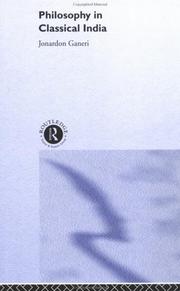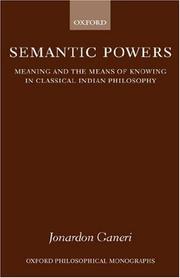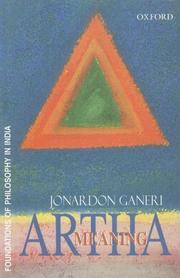| Listing 1 - 10 of 25 | << page >> |
Sort by
|
Book
ISBN: 9780415712064 9780415712057 041571205X 0415712068 9780415712071 0415712076 9780415712088 0415712084 9780415712095 0415712092 Year: 2016 Volume: 4 Publisher: Abingdon ; New York : Routledge,
Abstract | Keywords | Export | Availability | Bookmark
 Loading...
Loading...Choose an application
- Reference Manager
- EndNote
- RefWorks (Direct export to RefWorks)

ISBN: 0415240344 0415240352 9780415240345 9780415240352 020315827X 0203171195 1134551630 1134551649 1280401591 Year: 2001 Publisher: London : Routledge,
Abstract | Keywords | Export | Availability | Bookmark
 Loading...
Loading...Choose an application
- Reference Manager
- EndNote
- RefWorks (Direct export to RefWorks)
This original work focuses on the rational principles of Indian philosophical theory, rather than the mysticism more usually associated with it. Ganeri explores the philosophical projects of a number of major Indian philosophers and looks into the methods of rational inquiry deployed within these projects. In so doing, he illuminates a network of mutual reference, criticism, influence and response, in which reason is used to call itself into question. This fresh perspective on classical Indian thought unravels new philosophical paradigms, and points towards new applications for the concept of reason.
Philosophy, Indic --- Philosophie de l'Inde --- Philosophy, Indic. --- Indic philosophy --- Philosophy, East Indian --- Hindu philosophy
Book
ISBN: 9780199652365 0199652368 0191740713 0198709390 9786613593610 0191631280 1280498382 Year: 2012 Publisher: Oxford : Oxford University Press,
Abstract | Keywords | Export | Availability | Bookmark
 Loading...
Loading...Choose an application
- Reference Manager
- EndNote
- RefWorks (Direct export to RefWorks)
Soi (philosophie) --- Conscience de soi --- Conscience --- Esprit et corps --- Self (Philosophy) --- Self-knowledge, Theory of. --- Philosophy, Indic. --- Philosophy, Indic --- Self-knowledge, Theory of --- Philosophy --- Introspection (Theory of knowledge) --- Knowledge, Reflexive --- Knowledge of self, Theory of --- Reflection (Theory of knowledge) --- Reflexive knowledge --- Knowledge, Theory of --- Personality (Theory of knowledge) --- Indic philosophy --- Philosophy, East Indian --- Hindu philosophy --- Conscience de soi. --- Conscience. --- Esprit et corps.
Book
ISBN: 9780199314621 9780199314621 0199314624 9780197503812 9780190885007 9780190253127 Year: 2017 Publisher: New York (N.Y.) : Oxford university press,
Abstract | Keywords | Export | Availability | Bookmark
 Loading...
Loading...Choose an application
- Reference Manager
- EndNote
- RefWorks (Direct export to RefWorks)
The Oxford Handbook of Indian Philosophy tells the story of philosophy in India through a series of exceptional individual acts of philosophical virtuosity. It brings together forty leading international scholars to record the diverse figures, movements, and approaches that constitute philosophy in the geographical region of the Indian subcontinent, a region sometimes nowadays designated South Asia. The chapters provide a synopsis of the liveliest areas of contemporary research and set new agendas for nascent directions of exploration. Each of the chapters provides compelling evidence that in the global exercise of human intellectual skills India, throughout its history, has been a hugely sophisticated and important presence, host to an astonishing range of exceptionally creative minds engaged in an extraordinary diversity of the most astute philosophical exploration conceivable. It spans philosophy of law, logic, politics, environment, and society, but is most strongly associated with wide-ranging discussions in the philosophy of mind and language, epistemology and metaphysics (how we know and what is there to be known), ethics, meta-ethics, and aesthetics, and meta-philosophy. The reach of Indian ideas has been vast, both historically and geographically, and it has been and continues to be a major influence in world philosophy. In the breadth as well as the depth of its philosophical investigation, in the sheer bulk of surviving texts and in the diffusion of its ideas, the philosophical heritage of India easily stands comparison with that of China, Greece, the Latin West, or the Islamic world.
Indian philosophy. --- Indians --- Philosophy, Indian --- Philosophy --- E-books --- Indian philosophy --- India --- Philosophy, Indic.
Book
ISBN: 1501301500 1280123710 9786613527578 1441116079 9781441116079 9781441196576 1441196579 9781501301506 9781623565886 1441143831 Year: 2012 Publisher: New York : Continuum,
Abstract | Keywords | Export | Availability | Bookmark
 Loading...
Loading...Choose an application
- Reference Manager
- EndNote
- RefWorks (Direct export to RefWorks)
"In an increasingly multi-religious and multi-ethnic world, identity has become something actively chosen rather than merely acquired at birth. This book essentially analyzes the resources available to make such a choice. Looking into the world of intellectual India, this unique comparative survey focuses on the identity resources offered by India's traditions of reasoning and public debate. Arguing that identity is a formation of reason, it draws on Indian theory to claim that identities are constructed from exercises of reason as derivation from exemplary cases. The book demonstrates that contemporary debates on global governance and cosmopolitan identities can benefit from these Indian resources, which were developed within an intercultural pluralism context with an emphasis on consensual resolution of conflict. This groundbreaking work builds on themes developed by Amartya Sen to provide a creative pursuit of Indian reasoning that will appeal to anyone studying politics, philosophy, and Asian political thought."--Bloomsbury Publishing.
Philosophy, Indic. --- Self (Philosophy) --- Identity (Psychology) --- Personal identity --- Personality --- Self --- Ego (Psychology) --- Individuality --- Philosophy --- Indic philosophy --- Philosophy, East Indian --- Hindu philosophy
Book
ISBN: 9780198757405 9780198852193 Year: 2020 Publisher: Oxford Oxford university press
Abstract | Keywords | Export | Availability | Bookmark
 Loading...
Loading...Choose an application
- Reference Manager
- EndNote
- RefWorks (Direct export to RefWorks)

ISBN: 019823788X Year: 1999 Publisher: Oxford : Clarendon press,
Abstract | Keywords | Export | Availability | Bookmark
 Loading...
Loading...Choose an application
- Reference Manager
- EndNote
- RefWorks (Direct export to RefWorks)
Navya Nyāya. --- Philosophy, Indic. --- Semantics (Philosophy).

ISBN: 9780195671995 0195671996 Year: 2006 Publisher: New Delhi : Oxford university press,
Abstract | Keywords | Export | Availability | Bookmark
 Loading...
Loading...Choose an application
- Reference Manager
- EndNote
- RefWorks (Direct export to RefWorks)
This second volume in the Foundations of Philosophy in India series is an important contribution to the philosophy of language. Here Jonardon Ganeri highlights the significant relationship between semantic power and epistemic power to understand the important philosophical category of meaning.
Hindu philosophy. --- Meaning (Philosophy). --- Philosophy, Hindu. --- Semantics (Philosophy).
Book
ISBN: 9780198074137 0198074131 Year: 2011 Publisher: Oxford Oxford University Press
Abstract | Keywords | Export | Availability | Bookmark
 Loading...
Loading...Choose an application
- Reference Manager
- EndNote
- RefWorks (Direct export to RefWorks)
Book
ISBN: 9780198709398 Year: 2015 Publisher: Oxford Oxford University Press
Abstract | Keywords | Export | Availability | Bookmark
 Loading...
Loading...Choose an application
- Reference Manager
- EndNote
- RefWorks (Direct export to RefWorks)
| Listing 1 - 10 of 25 | << page >> |
Sort by
|

 Search
Search Feedback
Feedback About UniCat
About UniCat  Help
Help News
News